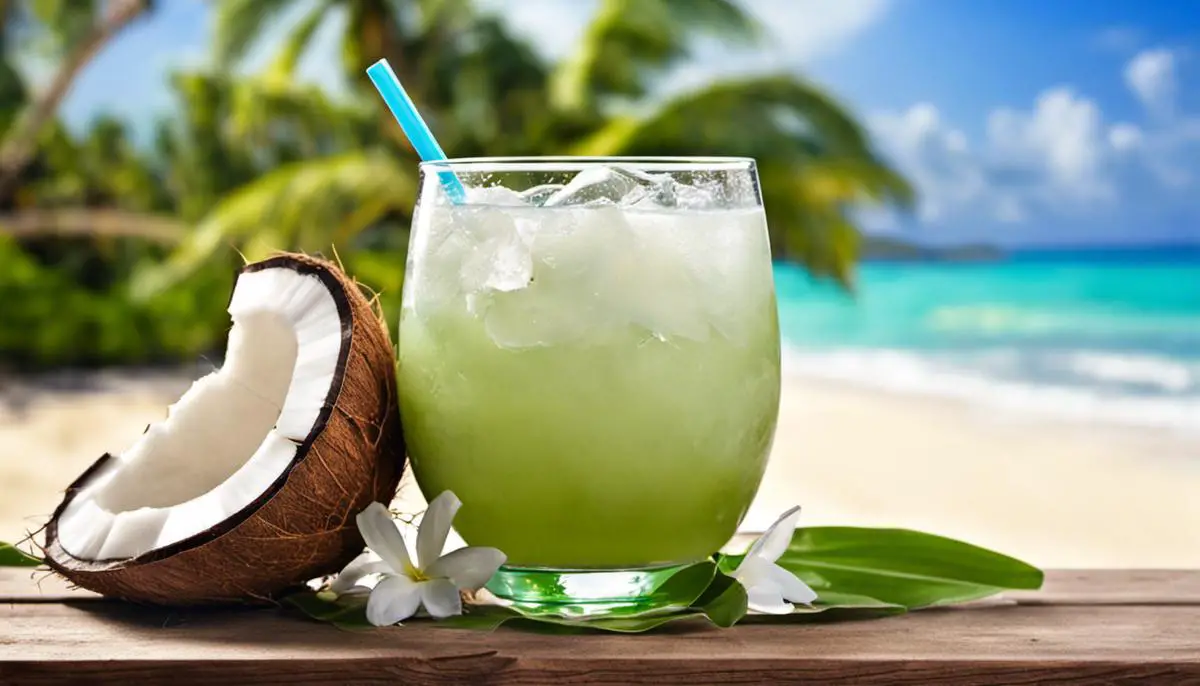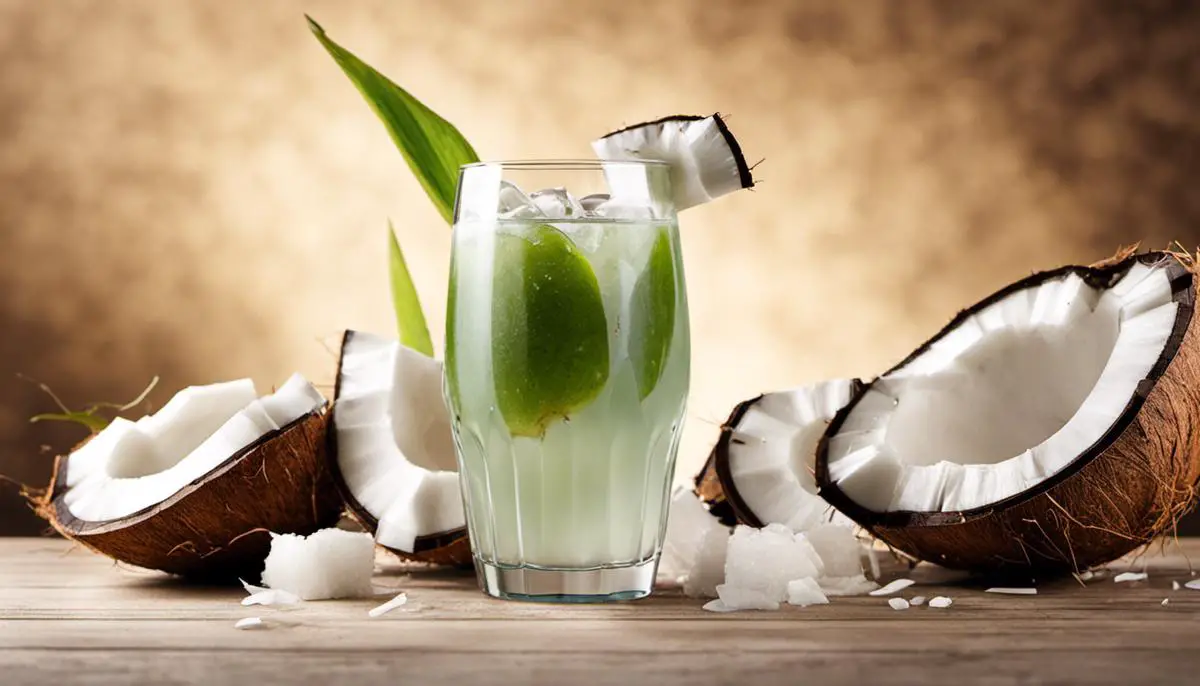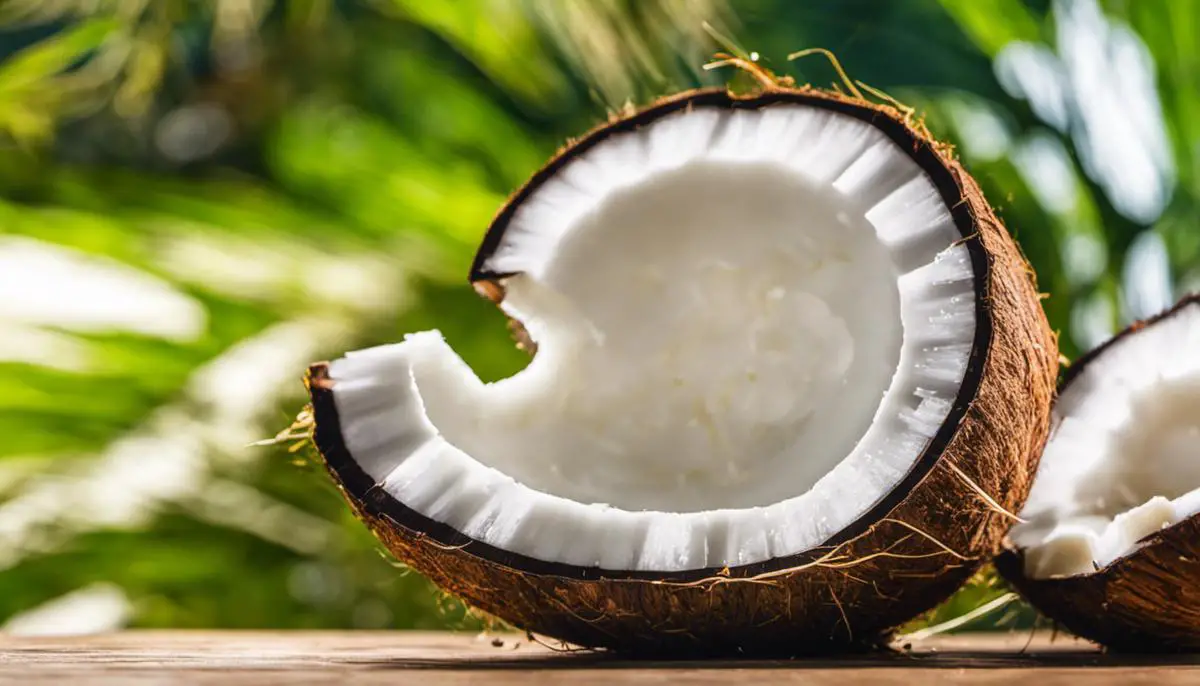Table of Contents
Coconut water, a refreshing natural beverage, not only quenches your thirst but also offers an array of health benefits due to its potent hydration abilities. Highlighted for its rich mineral content, primarily potassium, magnesium, and sodium along with potent antioxidants, coconut water clearly outshines conventional sports and energy drinks. Instead of loading the body with sugars and artificial flavorings, it nourishes us with essential nutrients in their purest, organic form. The details about its unique composition and the science-backed insights on its hydrating power are being increasingly illuminated by modern research. This article aims to dig deep into the composition of coconut water and investigates how it surpasses other sports drinks despite their widespread use. Furthermore, it scours scientific research to unveil the true hydrating power of coconut water and offers practical recommendations for incorporating this superfood into your daily hydration regimen.
Understanding the Composition of Coconut Water
Coconut water: A Natural Beverage with Multiple Health Benefits
Coconut water is a natural beverage that’s immensely rich in nutrients and offers multiple health benefits, including improved hydration. Its hydrating properties mainly originate from its high water content – approximately 95% – and its mineral composition, which includes key electrolytes like potassium, sodium, calcium, and magnesium.
The Role of Potassium in Hydration
Potassium is a vital mineral found in high quantities in coconut water. Just one cup of coconut water can contain up to 600 mg of potassium, making it higher in potassium than the typical sports drink. This mineral plays a crucial role in maintaining heart health and facilitating effective nerve transmission. Moreover, potassium aids in muscle contraction, which is particularly beneficial when exercising or participating in strenuous activities. Through these functions, potassium helps the body maintain fluid and electrolyte balance, effectively promoting hydration.
Sodium: Replenishing Lost Electrolytes
In addition to potassium, coconut water also contains sodium, albeit in smaller amounts. Sodium is another key electrolyte that the body loses through sweat, particularly during intense physical activity. It functions to maintain water balance in the body’s cells. Consuming coconut water after exercise can help replenish the lost sodium and foster hydration.
Calcium and Magnesium: Supporting Hydration
Calcium and magnesium, two other trace minerals found in coconut water, also support hydration. Calcium helps maintain the function of muscles, nerves, and cells, while magnesium aids in hundreds of biochemical reactions in the body, including nerve and muscle function, maintaining a steady heartbeat, and aiding in the production of protein and bone.
Antioxidants: Protecting the Body
Coconut water also contains antioxidants, molecules that help the body remove free radicals generated by metabolic activity or exposure to environmental toxins. The antioxidants present in coconut water, including vitamin C and phytonutrients like flavonoids, help protect the body from oxidative damage. This can speed up recovery, reduce inflammation and thus contribute indirectly to staying adequately hydrated.
Post-Workout Recovery and Energy
Moreover, the natural sugars found in coconut water help replenish energy and make it a favorable drink post-workout. However, it’s essential to distinguish between pure coconut water and variants with added sugars, as the latter may not provide the same health benefits.
A Hydrating Option for Weight Management
Finally, coconut water has a low calorie and high fiber content, which helps maintain feelings of satiety, providing a hydrating option that supports weight management.
Summarizing
To bring it all together, the hydration properties of coconut water can be attributed to its unique concoction of key minerals, antioxidants, and natural sugars. It serves as a nutrient-rich drink that can be particularly refreshing. However, it is crucial to remember that while it is a healthy beverage option, its benefits can be most optimally enjoyed when consumed as part of a balanced, varied diet.

Coconut Water vs. Other Sports Drinks
Comparing Coconut Water and Traditional Sports Drinks
Recently, coconut water has emerged as a popular choice for thirst-quenching, particularly among those who are conscious about health and wellness. This beverage, found naturally in young, green coconuts, is loaded with vital electrolytes such as potassium, sodium, magnesium, and calcium, making it an effective rehydration agent. This quality invites an interesting comparison with the properties of conventional sports and energy drinks.
Traditional Sports Drinks
Traditional sports drinks, initially designed for athletes to replenish the electrolytes lost in sweat during intense physical activities, are typically high in sugars and artificial flavors. These drinks include various amounts of sodium, potassium, and often, manufactured and processed sugars for quick energy. While they can indeed restore hydration and energy levels efficiently, the concern lies in the high sugar content, artificial flavorings, and the potential long-term health risks associated with their regular consumption.
Coconut Water as a Healthier Alternative
On the contrary, coconut water is low in sugar and calories, making it a healthier alternative. It contains a similar number of electrolytes as traditional sports drinks but tends to carry higher levels of potassium, aiding in muscle function and heart health. Unlike sports drinks, which often contain glucose-fructose syrup or fructose, coconut water’s sweetness comes from naturally occurring sugars, making these slowly released into the bloodstream, helping to prevent a sugar crash.
Hydration and Nutrition
Coconut also contains essential amino acids, antioxidants, and enzymes that can bolster heart health, reduce oxidative stress, and improve digestion. Regular consumption can also aid with weight loss efforts, given its low calorie and high fiber content.
One drawback to remember is that coconut water can also be high in sodium, an electrolyte that helps regulate water balance in the body. While this can be advantageous for those engaging in extended periods of physical activity where plenty of sodium is lost through sweat, it may not be beneficial for individuals with health conditions that require a low sodium diet.
The Healthier Choice
When it comes to maintaining electrolyte balance and hydration levels, there isn’t much difference between coconut water and traditional sports drinks. But where coconut water stands out is its all-natural composition, meaning it’s free from artificial colors, flavors, and additional sugar often found in sports drinks. Its lower calorie count, potential health benefits, and slight edge in nutrient content give it an advantage over traditional sports drinks, especially for average consumers leading a less intense training regimen.
Despite these benefits, it’s essential to pay attention to the source of your coconut water. Some commercial brands may contain additional sugars or flavors. Always opt for pure, unsweetened versions to reap the maximum health benefits from this nutritious tropical beverage.
Wrapping it up
For a natural and nutritious source of hydration and electrolyte replenishment, coconut water is an excellent choice. This isn’t to devalue the role of traditional sports drinks, especially for those engaging in intense or long-lasting physical activities, where these beverages remain a go-to option. The key is to understand your individual health requirements, and consulting with healthcare professionals if necessary is always beneficial.

Scientific Evidence for the Hydration Power of Coconut Water
Coconut Water Explained
Sourced from young, green coconuts, coconut water is a natural drink packed full of essential electrolytes such as potassium, sodium, and calcium, making it essentially a ‘hydration powerhouse’. But that’s not all – coconut water also contains carbohydrates in the form of simple sugars, which the body can easily absorb and convert to instant energy.
Coconut Water Vs. Traditional Sports Drinks
In the world of sports and physical activities, hydration is vital. Traditional sports drinks have been the go-to rehydration drink for active individuals. These drinks are typically packed with electrolytes and carbohydrates, which are key in replenishing lost electrolytes during sweating and supplying energy to muscles. However, recent scientific evidence suggests that natural alternatives such as coconut water can be as effective, if not more advantageous, than these conventional sports drinks.
Scientific Studies on Coconut Water Hydration
Several scientific studies have been conducted to test and validate the hydrating power of coconut water. A study published in the “Journal of Physiological Anthropology and Applied Human Science” compared the hydration effects of water, a carbohydrate-electrolyte beverage, and coconut water on exercise-induced dehydration. The research found that coconut water was similar in effectiveness to the conventional sports drink and was slightly superior to plain water in replenishing lost electrolytes and body fluid after a strenuous exercise.
In another study conducted by the “Journal of International Society of Sports Nutrition”, coconut water and a high-electrolyte sports drink were compared on their effectiveness on measures of hydration and physical performance. The results revealed that there were no major differences in the hydration state between the two groups, indicating that coconut water could be a feasible alternative for maintaining hydration in physically active individuals.
Benefits of Coconut Water for Active Individuals
For physically active individuals, maintaining proper hydration is essential. Coconut water, given its high potassium and electrolyte content, provides an effective and natural way to replenish lost fluids and necessary electrolyte balance in the body during and post physical activities. It has a lower sugar content compared to conventional sports drinks, making it a healthier choice for athletes and fitness enthusiasts who need to stay hydrated but also want to limit their sugar intake.
Another noteworthy benefit of coconut water is its potential effect on muscle cramps. As it is rich in potassium, an element known to help control muscle contractions and prevent cramps, it can be a useful drink for people engaging in high-intensity or long duration physical activities.
The Power of Coconut Water Hydration
Coconut water has emerged as a popular hydration solution, evidenced by numerous scientific researches. It’s a natural, healthy alternative to conventional sports drinks, known for its effective rehydration and electrolyte restoring abilities. While continuous studies are ongoing to further verify its numerous benefits and various applications, current indications suggest that coconut water has a significant role to play in hydration, proving beneficial especially for physically active individuals. It’s a refreshing and healthy means to keep hydration levels optimal during and post physical exertions.

Practical Tips for Using Coconut Water for Hydration
Decoding the Hydration Benefits of Coconut Water
More than just a revitalizing drink, coconut water serves as a natural reservoir of vital nutrients. Abundantly found in young green coconuts, its transparent liquid is enriched with electrolytes such as potassium, magnesium, and calcium. These fundamental nutrients work in tandem to restore hydration levels, thereby positioning coconut water as an impeccable choice for fluid replacement.
When Should You Drink Coconut Water?
Effectively incorporating coconut water into your hydration routine depends on the timing and quantity consumed. For those consistently active, it can serve as a natural sports drink, ingested before, during, or after vigorous physical activity. The potassium present in it aids in muscle function, reducing the likelihood of cramps during high-intensity workouts. Drinking coconut water in the morning aids digestion and enhances metabolism, kickstarting your day on a healthy note. It has also been found effective in restoring hydration balance when used as a treatment for mild cases of dehydration, caused either by physical exertion, illness, or drinking alcohol.
How Much Coconut Water Should You Drink?
The amount of coconut water one should drink varies depending on individual needs, age, and health conditions. A general guideline is to consume about 8 ounces of coconut water post-workout or physical activity. This amount will refresh you without overloading on calories. For someone aiming to treat mild dehydration, it’s advisable to sip coconut water throughout the day, alternating with regular water. However, one should be cautious not to excessively consume coconut water due to its high potassium content, which could lead to hyperkalemia, a condition caused by high levels of potassium in your blood.
Choosing the Right Coconut Water
When buying coconut water, it’s essential to check the product’s freshness and authenticity. Always look for 100% pure coconut water without added sugars, flavors, or preservatives. A good-quality coconut water will not be overly sweet and will have a slight nutty flavor.
Storing Coconut Water for Maximum Freshness
Lastl, maintaining the freshness of coconut water is vital for enjoying its full range of benefits. After opening a packaged coconut water, it’s best to refrigerate it and consume within 24 to 48 hours. If you’ve tapped a fresh coconut, its water should ideally be consumed immediately since exposure to air and warm temperatures will affect its taste and nutritional quality over time.
In conclusion
while coconut water provides many health benefits and serves as an excellent hydrating agent, it should be consumed thoughtfully. Always choose pure coconut water products and pay attention to personal health needs and physical condition to get the maximum benefit from this refreshing beverage.

Coconut water, being a treasure trove of nutrients, is a robust and natural alternative to synthetic sports drinks for maintaining hydration. Its possession of various minerals like potassium, magnesium, and sodium along with the grace of antioxidants, provides it a unique ability to hydrate efficiently. Scientific studies are increasingly reinforcing these benefits, declaring coconut water as a powerful tool for the prevention of dehydration and as an aid in sustaining physical exertion. Making coconut water a part of your routine is not just easy, but it is also vital for individuals who value their health and wellbeing. From choosing the right type to storing it properly, everything plays a role in maximizing its potential benefits. Navigate through this journey of hydration with coconut water and relish the wellness it brings along.

